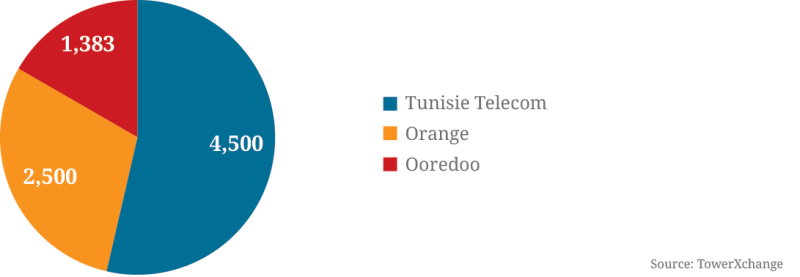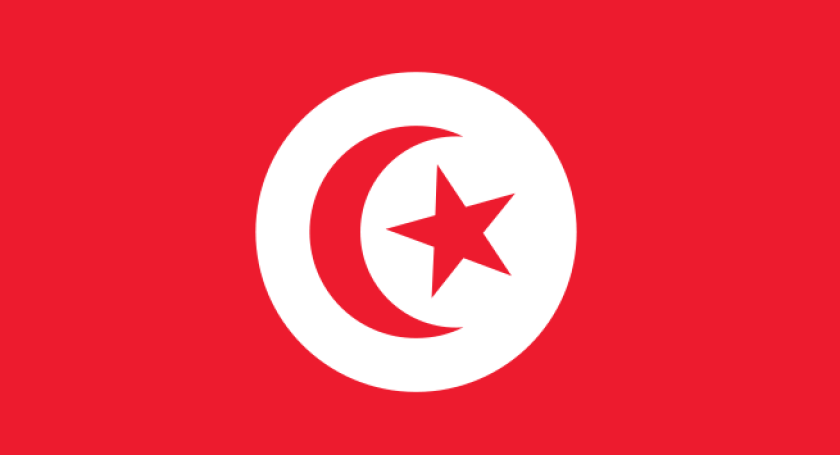There are 14.2mn active subscribers (source: INTT Q1 2018) and three MNOs in the Tunisian market; market leader Ooredoo, Orange and Tunisie Telecom. We take a look at the background factors which have affected the fortunes of Tunisia’s MNOs, assess current market tower ownership and introduce the local towercos carving out a niche for themselves in this developing market.
Market overview
While politically Tunisia has seen rapid development towards an open and democratic system since the Arab Spring began in 2010, economically it still has some way to go. The country saw some economic acceleration in 2017, however the political situation, while more democratic, is still fragmented, resulting in a lag in passing reforms which would help to boost the economy. The Tunisian economy has not been helped by low oil and gas prices, with the services sector showing the strongest growth over the last year, but investment, exports and productivity are still below the levels of ten years ago.
Governmental austerity measures and continuing high unemployment are causes of ongoing social unrest, seen by many to be driven by a loan from the International Monetary Fund agreed in 2014 for $2.8bn, which is placing the Tunisian government under pressure to devalue the dinar.
Security issues, including terrorist attacks, have also destabilised the country over the last few years and have had a significant impact on income from the tourist sector.
However, Tunisia has a young and growing population and the government has identified communications as a sector for wealth and job creation, to which is has committed funds to projects in the sector and is planning for the expansion of state operator Tunisie Telecom.
Tunisia’s mobile network operators
Despite the current economic situation in Tunisia, it has one of the most sophisticated telecommunications and broadband infrastructures in North Africa. The government’s Digital 2020 programme, running from 2018-2022 and anticipated to cost US$153mn, is driving growth in this area. Much of the programme will be funded by a loan of $85.1mn from the African Development Bank, with Tunisian Minister of Communication and Digital Economy Anwar Maaroufi claiming that “Digital Tunisia 2020 will enable the country to become the first at the African level to invest in the digital economy.”
A number of further regulatory measures and infrastructure projects have been put in place to improve connectivity across the country, including a reform of the Telecommunications Act in 2013 which officially abolished government censorship, as well as laws supporting e-commerce and digital signatures.
The government is pushing ahead with plans to list its 65% stake of Tunisie Telecom on the Tunis stock exchange, with the expectation that the funds raised could be ploughed back into the company’s expansion plans, which include the acquisition of Maltese quad-play operator GO in 2016.
The government also announced its intention to sell its stakes in Ooredoo and Orange in Tunisia (10% and 51% respectively) at the end of 2016, although this has not materialised as yet.
Tunisia has a strong nationwide fibre backbone and international access to submarine and terrestrial fibre. Tunisie Telecom owns fibre and both Ooredoo and Orange own fixed line licences in Tunisia, competing with a dozen other players in the sector.
Tower ownership by Tunisia’s MNOs

Tunisie Telecom
With 31.9% market share, Tunisie Telecom is the second biggest operator in Tunisia. The incumbent is leading the way in investment in its LTE network, building up a vectoring VDSL and rolling out an extensive fibre infrastructure.
65% of the company is owned by the Tunisian Government, and the remaining 35% by Emirates International Telecommunications (EIT). In late 2017 EIT had agreed the sale of their stake to private equity firm Abraaj Group for $2.25bn, which would have been the biggest ever private equity investment in Tunisia. The deal was announced as cancelled, however, in April 2018..
It’s not clear what the future holds for Tunisie Telecom’s ownership, but EIT are believed to have had a rocky relationship with the Tunisian government, in particular over the cancellation of Telecom Tunisie’s first IPO attempt, which was announced in 2010 and cancelled in 2011. It’s believed that the Tunisian government intends to press ahead with the IPO of their 65% stake, although EIT’s plan remains unclear.
Operationally, Tunisie Telecom has the most comprehensive network in Tunisia, and in June 2018 signed a new Partner Market agreement with Vodafone, a non-equity agreement under which Vodafone will provide strategic and operational support in a number of areas for three years, including roaming and carrier services agreements, enterprise, consumer, technology and procurement.
Ooredoo
Market leader Ooredoo Tunisia has 40.3% of the Tunisian market, and evolved from the second GSM network in Tunisia in 2002, originally operated by Egypt’s Orascom under the name Tunisiana, before being acquired by Ooredoo. The Tunisian government owns a 10% stake in the business, and although they made noises about selling this stake in 2016, as yet nothing has been announced.
Ooredoo launched Tunisia’s first IoT network with Sagemcom in Tunisia in 2017, aiming to facilitate Smart City (smart parking, presence detection, etc.), Smart Industry (machines predictive maintenance, asset management and tracking, logistics, etc.), Smart Environment (fire detection, etc.) and other uses in health, transport and agriculture.
Orange
Orange entered the Tunisian market as the third operator in 2010 and launched Tunisia’s first commercial 3G service, they currently have 26.1% of market share. Orange Tunisia is 51% owned by the Tunisian government, and, as with Ooredoo, has mooted the sale of their stake but as yet nothing has been confirmed.
Towers in Tunisia
There are an estimated 8,383 towers in the Tunisian market, split between the region’s MNOs. In addition, there are two new towercos active in North Africa, NATIC and Infrashare, which are setting their sights on build to suit activities in the country. NATIC has suggested that they see little opportunity for a sale and leaseback in the short term in Tunisia.
Infrastructure sharing exists, for example Orange report that approximately a third of its Tunisian sites are shared with other MNOs. In addition to passive infrastructure sharing, Tunisie Telecom and Ooredoo have a RANsharing deal in the country into which there had initially been discussions to include Orange.
Opportunities in Tunisia?
The Tunisian government is certainly open to promoting the growth of communications infrastructure, and as the economy stabilises, this market will see significant mobile data growth. However, the uncertain future of Telecom Tunisie means it is less likely that the towers will come to market than it seemed a year ago, and neither Orange nor Ooredoo have yet sold any towers in the MENA region.
For the right towerco, with an eye on the long term convergence of Tunisia’s datacentres and fibre with passive infrastructure as 5G begins to roll out, there may be an opportunity, but in the short term it will be hard to achieve scale. We will follow with interest the growth of NATIC and Infrashare, whose excellent local knowledge may allow them to convert small built to suit growth into more fruitful relationships with Tunisia’s MNOs as the market develops.

